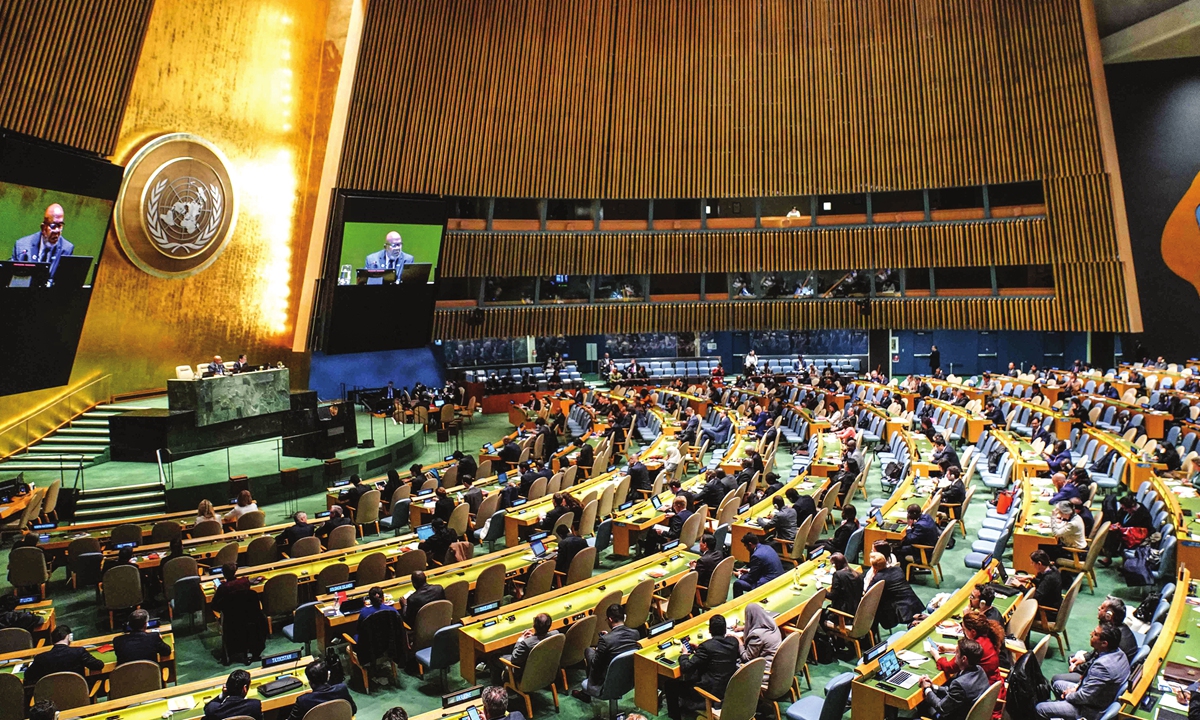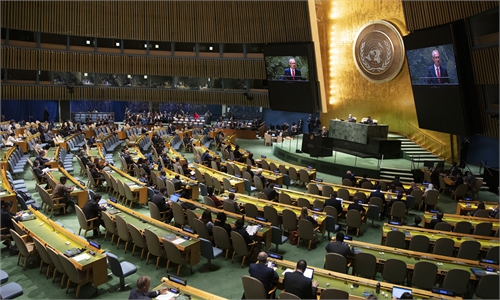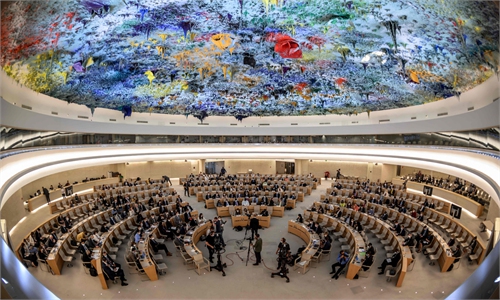
UN General Assembly President Dennis Francis reads the election results of new members to the Human Rights Council, at UN headquarters on October 10, 2023.Photo: VCG
China was successfully reelected as a member of the Human Rights Council on October 10 at the 78th session of the United Nations General Assembly for the term 2024 to 2026. This is the sixth time that China has been elected to the Human Rights Council since its establishment in 2006. Against the backdrop of unprecedented opportunities, challenges and uncertainties in the world, China's reelection signifies the international community's expectation that China will play a more constructive role as a founding member in global human rights governance.
The Human Rights Council is the most important human rights body under the United Nations, and is the most universal intergovernmental multilateral platform for the discussion and consideration of human rights issues in the world today. At the beginning of this century, the UN reaffirmed that human rights, development and security are its three interlinked pillars. In 2006, the UN set up the new Council to replace the Commission on Human Rights, which had been criticized for political confrontation, in order to promote the universality, impartiality, objectivity and non-selectivity in human rights protection. This is a new trend and direction in global human rights governance.
In the face of the increasing voice and participation of developing countries in the UN human rights mechanism, the US, which proclaims itself to be the "guardian of human rights," has persisted in pursuing a path of unilateralism. Its refusal to participate in the meetings and withdrawal from the Human Rights Council is an opposite example of respecting and safeguarding human rights as a major power. Meanwhile, China's consistent and positive stance contrasts sharply with the US' take-it-or-leave-it practice.
The politicization, instrumentalization and weaponization of human rights have become prominent, and international human rights protection faces great uncertainty. While the UN human rights mechanisms had endeavored to abolish double standards and the treatment of human rights as a tool of diplomatic struggle, the US and West are still unable to view developing countries objectively on an equal footing, leading to increasing confrontation in the field of human rights.
More than ever the world needs unity. The scientific and technological progress as well as economic and social development should have brought about enormous potential for the advancement and realization of human rights. However, the human rights progresses might be easily diminished or even erased, and the realization of human rights may vanish like bubbles.
Human rights are a symbol of human progress. The realization of human rights requires a peaceful and stable social environment, a sustainable economy and an inclusive civilization. The Global Security Initiative, Global Development Initiative and Global Civilization Initiative advocated and practiced by China are answers to the questions of the times, including "what is wrong with the world" and "where is the world going?" As clearly noted in the report to the 20th National Congress of the Communist Party of China (CPC), China will "follow a Chinese path of human rights development, actively participate in global human rights governance, and promote all-around advancement of human rights."
On June 28, the Law on Foreign Relations of the People's Republic of China was adopted by the Standing Committee of the 14th National People's Congress, which makes clear China's contemporary views of human rights, such as building a global community of shared future, upholding the common values of all humanity, and practicing the people-centered development. The Foreign Relations Law clarified China's position, attitude and approach. This is a model for current and future international relations, reflecting the right way to promote world peace, development and the progress of human rights.
At the critical juncture with limited time and resources, all countries should follow the trend of history and society, and promote the development of global human rights governance in the direction of greater fairness, justice, reasonableness and inclusiveness. Over the years, China has advocated a range of resolutions within the Human Rights Council, calling for constructive dialogue and cooperation in the field of human rights, the people-centered development, and the elimination of any form of colonialism.
Since the beginning of this year, China has initiated joint statements through the Human Rights Council in multiple areas covering artificial intelligence, social integration and barrier-free construction, advocating the protection of the rights of specific groups such as the elderly, women and persons with disabilities, which have widely resonated by the international community.
To promote the healthy development of human rights in the world, all countries should achieve harmony in diversity on the basis of equality and mutual respect. China's reelection in the UN Human Rights Council will surely enable it to better demonstrate its commitment and play its role.
The author is the Executive Director of the CASS Center for Human Rights Studies. opinion@globaltimes.com.cn


